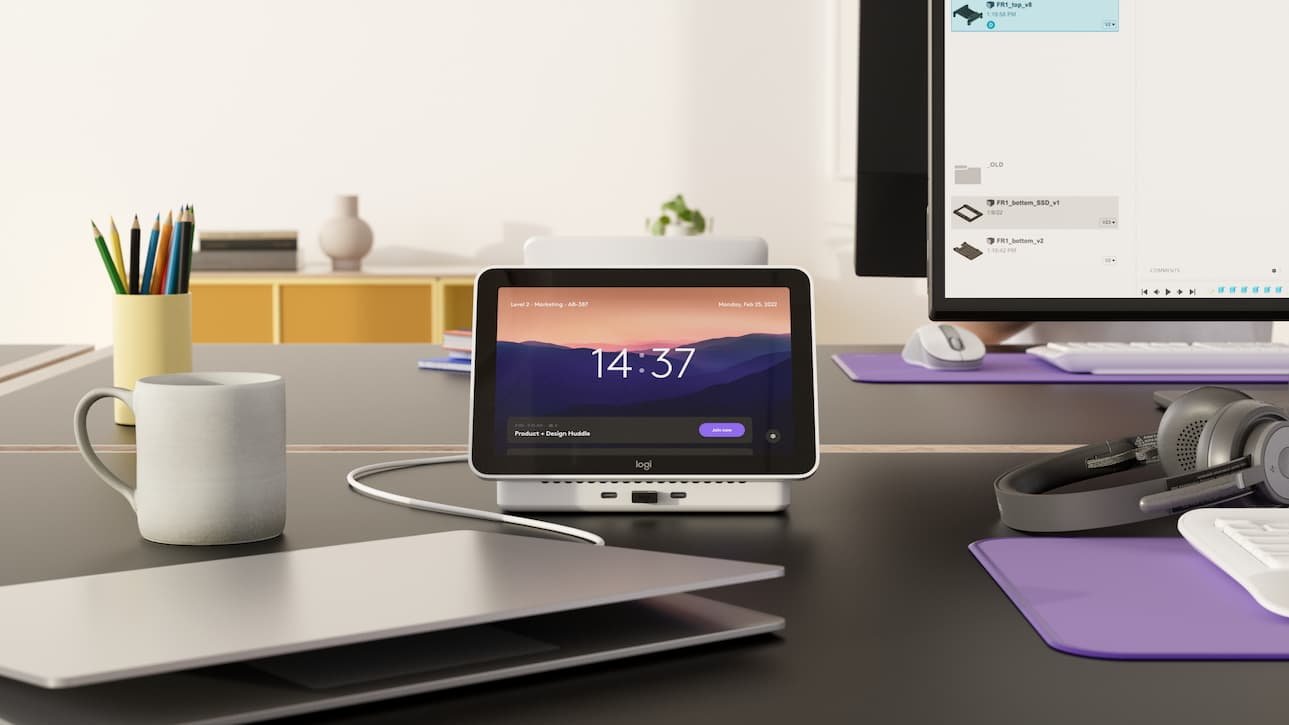Logitech tries to fix hotdesking headaches with $699 Logi Dock Flex
Logitech's latest $699 USB-C docking station is designed to make desk sharing in an office even easier, thanks to new built-in desk booking software.

Logitech's Logi Dock Flex
The Logi Dock Flex is an all-in-one USB-C docking station, built specifically to alleviate some of the stresses of hybrid work environments. The standout feature, something not typically available on standard docking stations, is the eight-inch display that sits above the base with all the ports.
On the front of the station are a pair of USB-C ports, and a single USB-A port which Logitech calls "USB 3.2" ports without specifying speed. There are two more USB-A ports on the back, just in case you need more, along with one more additional USB-C port.
A Kensington Lock slot is on the back of the Logi Dock Flex, paired with a gigabit Ethernet port. The new docking station also supports up to a pair of external 4K monitors, via the HDMI port and DisplayPort.
Up to 100W of charging power can be supplied to a host laptop, through USB-C.
That eight-inch touchscreen supports different work tools necessary in a shared workspace, including Zoom Workspace and Microsoft's Teams. It can also be used to do simple things, like show a calendar, away messages, or photographs.
Where the shared desk management comes in, is through Logitech's new desk booking software. It works via Logitech Sync, and manages who is using which desk, and when, not just for workers but for management as well.
The Logi Dock Flex will be available in one color, off-white, and retail for $699 when it launches in the fall of 2023. Logitech's desk booking software is free and available starting May 24. The Logi Dock Flex is the successor to Logitech's Logi Dock, which launched in late 2021.
Read on AppleInsider

Logitech's Logi Dock Flex
The Logi Dock Flex is an all-in-one USB-C docking station, built specifically to alleviate some of the stresses of hybrid work environments. The standout feature, something not typically available on standard docking stations, is the eight-inch display that sits above the base with all the ports.
On the front of the station are a pair of USB-C ports, and a single USB-A port which Logitech calls "USB 3.2" ports without specifying speed. There are two more USB-A ports on the back, just in case you need more, along with one more additional USB-C port.
A Kensington Lock slot is on the back of the Logi Dock Flex, paired with a gigabit Ethernet port. The new docking station also supports up to a pair of external 4K monitors, via the HDMI port and DisplayPort.
Up to 100W of charging power can be supplied to a host laptop, through USB-C.
That eight-inch touchscreen supports different work tools necessary in a shared workspace, including Zoom Workspace and Microsoft's Teams. It can also be used to do simple things, like show a calendar, away messages, or photographs.
Where the shared desk management comes in, is through Logitech's new desk booking software. It works via Logitech Sync, and manages who is using which desk, and when, not just for workers but for management as well.
The Logi Dock Flex will be available in one color, off-white, and retail for $699 when it launches in the fall of 2023. Logitech's desk booking software is free and available starting May 24. The Logi Dock Flex is the successor to Logitech's Logi Dock, which launched in late 2021.
Read on AppleInsider

Comments
I have Dell monitors that does everything this dock does (monitors with USB-C hubs built in along with Ethernet and PD charging to laptop) that cost less than half this gadget and I get a 24" 1440p screen!
Is it expensive? Yes. Does it solve a niche problem? Yes. Is it for everyone? Absolutely not.
I setup 4 stations at a client office that is used for mobile workers who visit the office. A shared Outlook calendar does the trick.
Companies with lots of high cost, mobile workers will pay out to keep people working rather than faffing around with admin to ensure they have a desk and its in proximity to their co-workers. And there's a lot of such companies around, getting in with even just one of the McKinseys, Accentures, Deloittes, PWCs, or any of the others would probably justify the product on its own.